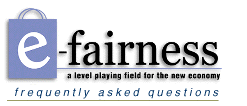 |
|
 |
Frequently Asked Questions: Q: What is the e-Fairness Coalition? The e-Fairness Coalition represents a total of over 1.5 million retail stores and real estate businesses as well as 1 out of every 5 American workers nationwide. Its members include brick-and-mortar and online retailers, retail corporations and associations, publicly- and privately-owned shopping centers, outlet centers and independently owned shops. The Coalition advocates fairness for businesses and consumers. It supports a level playing field that ensures consumers are treated fairly regardless of where they choose to shop - in traditional or online stores.
Q: What is the Internet Tax Freedom Act? The Internet Tax Freedom Act, passed by Congress in October 1998, imposed a three-year moratorium on Internet access taxes and on multiple or discriminatory taxes on electronic commerce. The legislation also created the Advisory Commission on Electronic Commerce to consider issues associated with the taxation of sales purchased on the Internet. The Commission completed its work in April of 2000 and issued a report to Congress. Unfortunately, the Commission was not able to reach the two-thirds vote required by Congress to make any official "findings or recommendations" on the subject of the collection of sales and use taxes on sales made over the Internet.
Q: Didn't the moratorium in the Internet Tax Freedom Act ban the collection of sales taxes on Internet sales? No. The Internet Tax Freedom Act only banned taxes on Internet access and on multiple or discriminatory taxes on the Internet. The Act did not prevent states and localities from collecting existing sales or use tax on sales made over the Internet.
Q: Who were the Members of the Advisory Commission on E-Commerce? The Panel was composed of 19 commissioners from state, local, and federal governments and from the businesses from the electronic commerce and high technology industries. Traditional, in-store retailers who conduct the vast majority of retail sales were not represented on the Commission.
Q: Does the e-Fairness Coalition support the implementation of new taxes on the Internet? No. The e-Fairness Coalition supports consistent application of a law that currently is being applied inconsistently. Requiring online merchants to collect an existing sales tax does not create a new tax. Brick-and-mortar retailers are required--by law--to collect sales tax on all consumer goods purchased in their stores. The Coalition favors equal application of the sales tax on all commercial transactions. It advocates the end of a discriminatory tax policy that excuses some online retailers from collecting sales tax. And, clearly opposes efforts to provide permanent tax subsidies to goods sold over the Internet.
Q: Are online and brick-and-mortar retailers currently required to collect sales tax? Online retailers without a physical presence in a state of the buyer do not have to collect that states' sales tax. Some online sellers that have a physical presence in the state of the buyer do collect sales tax. However, many retailers with both online and traditional stores have set up their online sales division as a separate subsidiary that does not collect sales taxes. In comparison, all brick-and-mortar retailers are required to collect sales taxes in states that impose a sales tax. All retailers, whether they are a local store or an online company deliver the same goods. These goods should all be taxed the same. Current policy gives online retailers a competitive edge over and discriminates against brick-and-mortar retailers.
Q: Are consumers who purchase goods online subject to the same policies as consumers who shop in a store? Although sellers are not obligated to collect a sales tax on the transaction in states where the seller does not have a store, consumers are obligated to pay an equivalent "use" tax to their home taxing jurisdiction when the retailer does not collect the sales tax. While consumers are required to pay a "use" tax, many are unaware of or often ignore this requirement. On the other hand, consumers who purchase an item at a local retailer or at a store in the mall must pay sales tax. The e-Fairness Coalition believes that all shoppers and businesses should be treated fairly. It supports the equitable collection of retail sales regardless of where a consumer chooses to shop, allowing everyone to contribute equally to the tax base.
Q: Does the current policy on collecting sales tax on purchases made online place an unfair tax burden on some Americans, but not others? Yes, according to the U.S. Department of Commerce, personal computers are present in 80 percent of homes in which families make $75,000 a year or more, but in fewer than 16 percent in which families make less than $20,000. Higher-income Americans who can avoid the sales tax by shopping online benefit at the expense of lower-income residents who lack access to computers and the tax-free online sales. Instead of tax breaks, lower-income residents will face higher taxes or fewer services to offset the lost revenues from online sales.
Q: What are the ramifications of not collecting sales tax on purchases made online? Commerce on the Internet is growing at a phenomenal rate, increasing the potential for loss of major tax revenues. The University of Tennessee projects that if states are allowed to collect sales taxes on online sales, the states will lose $20 billion annually by 2003. Not taxing e-commerce transactions will affect consumers in their own backyard. According to the U.S. Census Bureau, more than 33 percent of state revenues come from sales and use taxes. These revenues fund essential community needs such as schools, police and transportation services. The large revenue losses from uncollected sales and use taxes on online sales could force state governments to find other ways to offset their losses by either raising income or property taxes or significantly cutting back essential community services.
Q: Are there legislative solutions to level the playing field for all retailers? Yes, legislation has been introduced in both Houses of Congress that would encourage the states and localities to simplify their sales tax systems, and once simplification has been achieved, the legislation allows the states to require all retailers to collect sales taxes. H.R. 4462, the "Fair and Equitable Interstate Tax Compact Simplification Act of 2000," which has been introduced in the House of Representatives by Congressman Spencer Bachus (R-AL), and for the "Internet Simplification and Equity Act," which Senator Dorgan (D-ND) will introduce in the Senate, will provide a level playing field for sales tax collection.
Q: How will consumers benefit by a level playing field between online and brick-and-mortar retailers? A level playing field is what's best for the new economy. Internet sales, which have grown at a phenomenal rate, will continue to grow and benefit the U.S. economy. If sales tax exists, then it should be applied fairly to all transactions. This allows consumers to be treated the same, regardless of whether they choose to shop in a store or online. It also ensures that states will not have to find other ways to supplant the revenues they receive from sales tax to fund essential community services. Additionally, fair and healthy competition in the marketplace offers added value to consumers. With an equitable tax policy consistently applied to online and traditional retailers, consumers will benefit from competitive pricing, better offers and better customer service. Operating in a fair climate allows consumers to enjoy the freedom of shopping choices without tax preferences and communities to continue to see the many benefits that revenues from sales tax provide.
Q: Does the e-Fairness Coalition support Senator Wyden's "compromise" legislation? No. Senator Wyden's draft legislation is not an acceptable compromise, and the retail and real estate industries will oppose the bill when it is introduced. The Wyden bill would provide no authority, guidance, or incentives to the states for simplifying their sales tax systems. The bill would delay simplification and would establish a system under which three separate legislative enactments would be required in order to establish a level playing field for sales and use tax collection.
Q: Should Congress enact the S. 2401, the Gregg-Kohl bill, which seeks to clarify the requirements of the Supreme Court's Quill decision? Instead of promoting a level playing field, H.R. 2401 would promote sales tax avoidance by online retailers at the expense of brick and mortar retailers. This bill would facilitate retailers with physical and online stores to set-up their on-line sales group as a separate subsidiary that could avoid sales tax collection responsibilities. The bill encourages companies to contort their corporate structures solely to avoid sales tax collection responsibilities. While corporations would like to integrate their physical and online stores, this legislation would encourage retailers to separate their on-line and in-store strategies. Therefore, the e-Fairness Coalition opposes S. 2401.
|